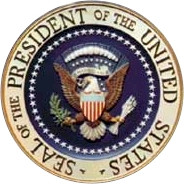
The Presidency: The Leadership Branch
Debate: Has the
Presidency become too powerful?
For the past 70 years repeated domestic and foreign
crisis have brought the necessity of vigorous executive leadership to solve problems.
Accompanying this increase in powers is the public's expectation that only
strong presidential leadership can end the partisan bickering and the malaise
in
We will debate this issue in class and try to decide two issues surrounding the presidential power. #1 Is the presidency too powerful? #2 Do we need a strong presidency?
To prepare for this debate, everyone is to finish the section in the book on the presidency (chapter 12), Arthur Schlesinger's famous article The Imperial Presidency, initially brought this question to the forefront but now the issue is in question. Read the analysis in the links below (especially in articles just after the impeachment of Clinton and Bush's war on terrorism.) for more information.
Your written debate should cover the following points but should not necessarily be limited to them:
1.) Growth of the president's powers to make war (War Powers Resolution)
2.) The president's dominance in foreign relations (executive agreements)
3.) Secrecy and executive privilege (could include the Imperial president)
4.) Judiciary Powers- the growing use of the president's power to pardon
5.) Government by veto
6.) The ability of the President to 'use' the media
7.) The increasing use of signing statements
What is to be turned
in?:
First: (a one page (double spaced) typed opening statement)
Which takes a side on the following question. Has the Presidency has become too powerful or do We need a stronger Chief
Executive)? Second: A one page bullet by bullet rebuttal to the argument you constructed in your essay.
Introductory Articles/Discussion about presidential power: 1 and 2
For Expanding/retaining Presidential Power (these are just a few examples- please research some of your own):
New York Times Says Strengthen the Presidency
Republicans and Democrats Agree Presidency Needs More Power
Pardons: Obama Should Use Pardon More
Both Sides on the war issue: Does the president have too much war power?
Against Extensive Presidential Power The President Isn't Powerful Enough (these are just a few examples- please research some of your own):
Congress Should Say No to Power GrabSlate Article
Cato Institute:
Exec. Orders http://www.cato.org/pubs/pas/pa358.pdf
alternet: Bush's Big Brother: http://www.alternet.org/story.html?StoryID=13714
CBSnews: Presidents & the Media: http://www.cbsnews.com/stories/2002/12/06/60minutes/main532107.shtml
Executive Orders: (an older article but still relevant) http://www.sonic.net/sentinel/gvcon5.html
President has too much war power: Repeal President's War Powers